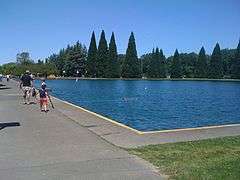Westmoreland Park
| Westmoreland Park | |
|---|---|
|
Pond at the park | |
 | |
| Nearest city | Portland, Oregon |
| Coordinates | 45°28′14″N 122°38′23″W / 45.47056°N 122.63972°WCoordinates: 45°28′14″N 122°38′23″W / 45.47056°N 122.63972°W[1] |
| Area | 42.01 acres (17.00 ha) |
| Created | 1936 |
| Operated by | Portland Parks & Recreation |
| Open | 5 a.m. to midnight daily |
Westmoreland Park is a municipal park located in the Westmoreland area of southeast Portland, Oregon's Sellwood neighborhood, United States.[2] The property for the park was acquired in 1936 and encompasses 42.01 acres (17.00 ha).[2] Located along McLoughlin Boulevard, the park straddles Crystal Springs Creek just downstream from the Crystal Springs Rhododendron Garden. The park is operated by Portland Parks & Recreation and includes sports fields, a playground, and pond.[2]
History
Prior to becoming a park, the land where Westmoreland Park sits was used for farming, a golf course, and even a landing strip.[2] The landing strip was originally known as simply aviation field, but in October 1919 became Broomfield Aviation Field.[3] It was named after a student at Reed College, Hugh Broomfield, who was a pilot who died during World War I while in combat.[3] In 1936, the city bought 45 acres (18 ha) from the Oregon Iron & Steel Company for use as a park, with Francis Benedict Jacobberger then commissioned to develop a plan for the new park.[2] Among other things, the plan called for a lagoon and pond that were to be used as ice rinks in winter.[2] Construction began on the park the same year, with labor provided by the Works Progress Administration.[2] The casting pond was completed that year, but about June 1937 other construction halted due to funding, but resumed in July 1939.[2] A baseball stadium was added in 1942, which was named as Sckavone Field in 1955.[2] Lawn bowling was added in 1945, and a restroom in 1949.[2]
After repeated flooding issues and the degradation of the water infrastructure in the park, a new master plan was developed to re-imagine the natural water features, which the plan was completed in 2003.[2][4] Construction on the revamped park was completed in 2014, with it re-opening in October 2014.[4] The project included conversion of the duck pond into wetlands, the installation of a nature-based playground featuring boulders and logs, and the addition of more paths.[4][5] The restoration of the wetlands allowed for the return of migrating salmon to the stream.[6] The United States Army Corps of Engineers assisted on the project, which cost $1 million to complete.[5]
Amenities
The park has a variety of sports features including a baseball diamonds, a football field, a soccer field, and a softball field.[2] The southern end of the park is occupied by Sckavone Stadium, which is used for baseball.[7] There are also tennis and basketball courts.[2] Other features include a playground, paths, picnic area and tables, and a restroom.[2] Uroboros is an outdoor sculpture by Charles Kibby, installed in 1979.
See also
References
- ↑ "Westmoreland City Park". Geographic Names Information System. United States Geological Survey. 1986-05-22. Retrieved 2014-10-28.
- 1 2 3 4 5 6 7 8 9 10 11 12 13 14 "Westmoreland Park". Portland Parks & Recreation. Retrieved October 28, 2014.
- 1 2 Killen, John (April 14, 2015). "Past Tense Oregon: Maps can give detailed clues to Portland-area past". The Oregonian/OregonLive. Retrieved 15 April 2015.
- 1 2 3 Lloyd, Michael (October 25, 2014). "Portland's Westmoreland Park celebrates its reopening, salmon invited". The Oregonian. Retrieved 30 October 2014.
- 1 2 Binder, Melissa (October 7, 2014). "City's first permanent nature-based play area open at SE Portland park". The Oregonian. Retrieved 30 October 2014.
- ↑ Gordon, Tim (October 22, 2014). "Restoration project brings salmon back to Portland park". KGW. Retrieved 31 October 2014.
- ↑ "Westmoreland Park - Sckavone Stadium". Portland Parks & Recreation. Retrieved October 28, 2014.
External links
-
 Media related to Westmoreland Park at Wikimedia Commons
Media related to Westmoreland Park at Wikimedia Commons
